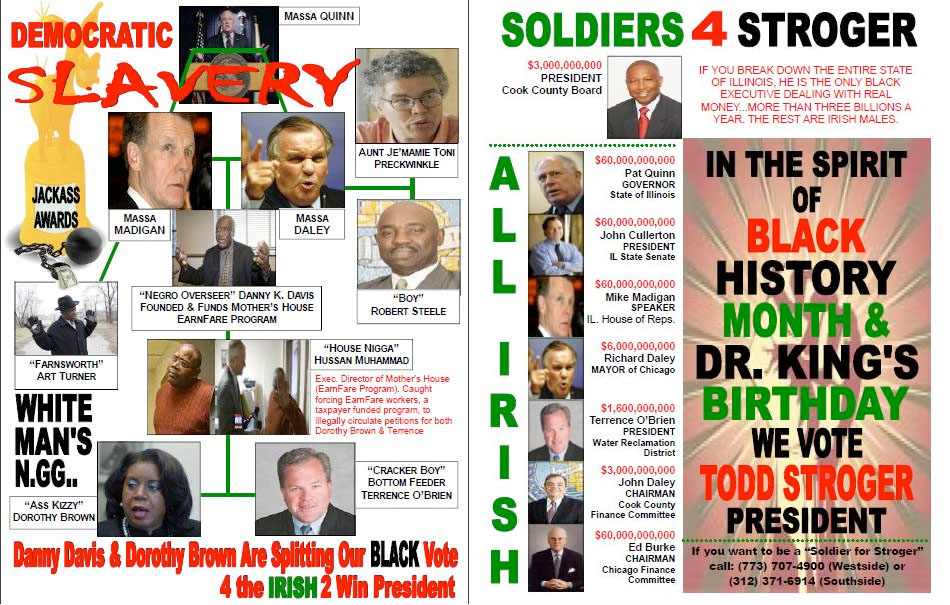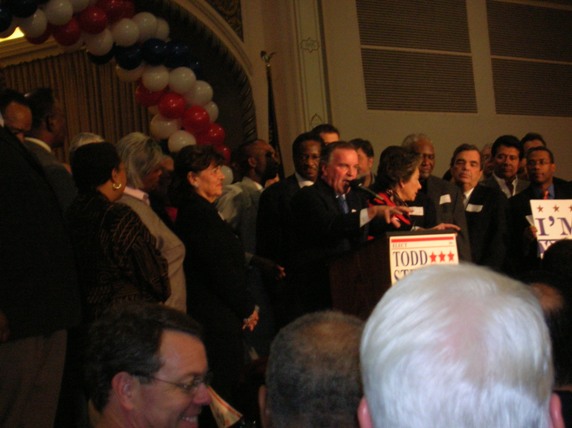| « Daley's Last Budget | Parents and Students Occupy Whittier School Fieldhouse » |
Identity Politics Fri Sep 17 2010
"The Guide to Being Brown" By Everybody Else
I had a clashing of two worlds that happens to brown people, particularly first generation brown people; this is when different groups of your friends collide. In this case it was some friends from work meeting some Assyrian friends of mine. Afterwards, one of my friends said I didn't act like myself around my Assyrian friends.
"How do you know I'm not not acting like myself around you?" I asked. It wasn't snide; I was honestly asking. To me, both selves are equally me.
This issue has been flogged to death; suffice to say that if you are white and have brown or black friends, please never tell them they're "basically white."
This is more common than you'd imagine, particularly for brown people of my ilk; I belong to a tiny ethnic group (less than 4 million worldwide) with no nation-state and who aren't that phenotypicaly distinct from descendants of Europeans. There aren't enough of us to generate stereotypes (except parochially--talk to people from West Rogers Park or Sodertalje). A creepy anthropological study of the people of northern Iraq (called "Southern Kurdistan" in the study) from the 1950s cataloged the Assyrian tribes and provided things like the average size of their skulls and chests, and the authors noted that many Assyrians are often "very light complected" and "could pass as Northern Europeans". My mom for example has blonde hair, greenish eyes, and milky fair skin; my dad on the other hand is dark, has a prominent Semitic nose, and deep-set dark features. I'm undeniably brown. But because I skateboarded and listened to punk rock as well as hip hop, and shed my accent, when push came to shove people would be kind enough to inform me that I was "basically white".

How cool is my mom? Studying science in Basra in the '60s.
I don't want to discuss a struggle with identity or the prejudice (or advantages) I've had because I'm brown and working class. Again, that's a boring story, boo hoo, sometimes things are hard. That's not my point.
No, my point is that identity politics is hindering the ability of this society to move forward on almost every front of human relations. Identity politics both torments people of color and sincere whites, constricts the genders, and scatters and disrupts almost every effort at collective effort made by the left; and it is very consciously deployed to that end by powerful elites.
"Identity politics" is also one of those amorphous concepts that is easy to set up as a nemesis for whatever, better belief system one has. (Not dissimilar from calling someone a "reductionist".) The identity politics that has wrought so much havoc builds out from the concept of "privilege" rather than a material definition of social relation to productive property (i.e., labor sellers and labor buyers). At a tactical level of politics (and policy) it emphasizes subjective, personal narratives as central to how society is ordered, and that encourages in-group behavior by generating cultural affinities and traditions. Various "anti-Imperialist" or "Third World" movements, including nationalisms of the more radical strains, are the archetypes.
The right wing pretends to hate identity politics but are expert practitioners of it; Sarah Palin is the pure distilled grain alcohol of that shit. I arrived at my distaste of identity politics honestly. It comes from being confronted by it while trying to do sincere community and labor organizing. Identity politics--appeals to race, ethnic, language, and religious in-group solidarity against outsiders--was deployed by powerful people to disrupt collective action. And it was used in a very ad hominem way, meant specifically to intimidate me and my comrades--of all races, men and women--out of trying to organize.
It began to come into focus years ago during a meeting of a community organization, discussing the city's political climate. I listened to an old white radical declaim a leading Black politician for endorsing a white man over a Black man in a Democratic Primary. Everybody in the room shook their heads sadly, while mine almost exploded. Who the hell were any of these people to tell that man who to endorse? The two candidates were virtually identical policy-wise. Yet this room of people felt entitled to make that decision for him.
This story is not dissimilar, micro-wise, to how identity politics was born and how it destroyed the unified youth Left in the 1968-9. An identity politics-focused wing of the Students for a Democratic Society (SDS) calling themselves the "Revolutionary Youth Movement" (and led by scions of the upper class like Bill Ayers and Bernardine Dohrn) tried to "expel" the worker-student alliance (by far the largest single faction) and the "progressive labor" contingent. The RYM faction quickly dissolved into its component groups. The SDS passed into obscurity within a couple years.

Bernardine Dohrn "disinviting" the labor movement
The manifesto of the "Revolutionary Youth Movement" stated,
[T]he main struggle going on in the world today is between US imperialism and the national liberation struggles against it. This is essential in defining political matters in the whole world: because it is by far the most powerful, every other empire and petty dictator is in the long run dependent on US imperialism, which has unified, allied with, and defended all of the reactionary forces of the whole world.
It went on to focus primarily on the struggle of the "Black colony" in the United States (identifying that group as the "vanguard" in the coming revolution), insisting that whites (or others) could have no meaningful role in Black liberation, and defining international class struggle in terms of the relationship to "US Imperialism". The manifesto went on to explicitly state that there could be no real solidarity between the "white working class" and the "Black colony" vanguard:
[V]irtually all of the white working class also has short-range privileges from imperialism, which are not false privileges but very real ones which give them an edge of vested interest and tie them to a certain extent to the imperialists.
Look, there's no doubt that members of the white working class enjoy some privilege that members of the Black and brown working class do not. Denying it--or minimizing it with a shrug--ignores a material fact. It is also true that male members of the Black working class enjoy privileges that female members of the Black working class do not; and that, further, LGBT members of the Black working class etc. Essentially there are numerous partitions inside of "the working class" (or in modern parlance, "the less fortunate"; the "underprivileged"), and identity politics explicitly states that we can never understand one another nor work with one another, except under the larger banner of opposing "privilege", which is only ever defined in subjective, "narrative" ways.
The problem with opposing identity politics is that it puts you in some odious company, the "angry white male" and "silent majority" wings of the conservative movement. But rejecting identity politics doesn't mean denying the legacy or reality of racism, sexism, homophobia, and xenophobia. Nor does it mean ignoring the need for equitable processes in politics--practitioners of identity politics are often fixated on processes, such as how meetings are run. What it means is recognizing power relationships that "dis-privilege" groups cannot be dismantled piecemeal; that a fundamental change in power relationships needs to happen first. It also means emphasizing our common humanity--cosmopolitanism, the human family--while recognizing cultural disparities. This of course has to be done without slipping into the lazy assumption of white, male, hetero, native normativity.
Ultimately, nationalistic identity politics is most brutally deployed not against whites to make them feel "guilty" but against people of color and women.
"Give us an example, Ramsin!"
If you've ever been in the trenches of city politics, especially in a city like Chicago, you've come across something like this:

That's fair.
What makes Toni Preckwinkle, who is now the Democratic nominee for Cook County Board President, an "Aunt Je'mamie"? Her husband is white. She lives in the middle class professional bastion of Hyde Park; and she works closely with a number of white politicians and white-dominated good government groups. She's broken ranks; she's not behaving correctly. By virtue of her pursuing reform politics regardless of race, she is "selling out". It isn't a stretch to think that this is the most racist attack Preckwinkle has suffered in her political career.
What's more, this despicable flier was distributed by Black Nationalist activists aligned with the incumbent Cook County Board President, Todd Stroger, son of deceased former President John Stroger, one of the most powerful men in County government for over a decade--and himself recently a favorite of the city's Irish elite.

On an individual level, this tortures people of color every day. A website like "Stuff White People Like" inadvertently feeds into these roles that are reinforced by the politics of personal narrative. NPR, organic food, foreign films: these are for people who are white-in-quotes, meaning they're not "ethnic". That's the thing about a "personal narrative" politics: it enables everybody--in-group, out-group--to define what it means to be authentic, to be "proud of who you are", etc. Everybody internalizes these restrictive definitions, and they are deployed as easily by the right as by the left, by white as well as Black and brown. Should we be surprised when Chris Matthews says that he "forgot Barack Obama was black"? Matthews was only expressing a sentiment deeply embedded in America's extraordinarily race-conscious civic discourse. "Blackness" (or "ethnic-ness") entails behaviors and opinions, and you can be somewhere on that slope according to your adherence to those trappings. Colin Powell is kinda Black; the X-Clan is very Black.

X-Clan Probably Doesn't Like You.
But of course, this is all horseshit. These are completely invented standards. By denying that having a certain taste in clothes or mates has any bearing at all to your Chinese-ness, doesn't minimize the appalling suffering of the Chinese in the first century and a half of our nation's history. Similarly, the actual, material legacy of hundreds of years of chattel slavery on the descendants of those people so enslaved isn't altered one bit by who one of those descendants chooses to marry. Facts are facts and will remain so.
I didn't sell out by falling in love with a wonderful woman who happened to be white. Nor would I be "betraying" my Assyrian ancestors by marrying a Turkish or Arab woman, even though Turkish and Arab nationalists wiped out 75% of the Assyrian population in a couple decades. Now, if I were to marry Kemal Ataturk or Rashid Ali, that'd be a different story. I'd have to be pretty insensitive to do that. As it stands, that's impossible (for two reasons, at least in Illinois).
At some point, we forgot that falling in love with someone from a different background, or people learning about and participating in cultures vastly different from their own were beautiful, inspiring things.
And the insistence that we keep "cultural traditions" alive? I have news for you. Possibly, depending on your disposition, bad news. Those traditions? We made them up. Recently. You know those Scottish kilts? Yeah, the Scots of yore never wore them. They were an invention of Scottish nationalists in the late Nineteenth Century. Those ancient Scots also didn't wear "tartans". All made up. None of it is real. So what is the tradition we're trying to uphold exactly? These things are fabricated precisely to create an in-group.
In my case, what about the Assyrian flag? I'm proud to be Assyrian in the sense that I want to recognize the struggles of my immediate ancestors for freedom, democracy, and a level of self-determination. But that flag I have tattooed on my arm? Invented in 1968. The "ancient" Assyrians from whom we claim descent (and from whom we derive our indigeneity to Mesopotamia) never waved it.

Younger than the Tonight Show.
There's a reason discussions of race often devolve into competing resumes; people providing personal narratives about their individual "struggles" or insisting that one isn't a racist because of who their friends are or because they tutor "inner city" youth. Because it's all subjective nonsense. It also lets people ignore (rather than acknowledge) class differences and participate in "radical" politics through identification with "Third World" struggles. Thus Dohrn and Ayers would write a book called Race Course. Dohrn led the "expulsion" of worker-student movements from the SDS working with groups like the Black Panthers as much to demonstrate just how radical she and the other white RYM leaders as for any practical purpose. The result was devolution of the entire organization.
Do you care if the boss exploiting you is the same race as you? So why the obsession with "ethnic-owned" businesses, and "executive training" programs for youth of color and women? Is your work life better when the CEO laying you off is a woman? None of this changes society's power dynamics; all it does is create more and more divisions within groups.
Which brings me to Brother Bayard.
Bayard Rustin was Black, gay, and a Communist. And he was on the cover of Life magazine (along with unionist A. Phillip Randolph) as the true organizer of the March on Washington.

Rustin described himself as spending "time on two crosses" for his dual advocacy of civil and LGBT rights. He was soon pilloried by identity politics hardliners for his "coziness" with "white" labor unions, specifically in the 1968 UFT Teachers strike in New York. When teachers union chief Al Shanker led the teachers out on strike after white teachers were targeted for purges in Brownsville, Randolph and Rustin spoke up, warning that the principle of firing people based solely on race--and violating a collectively bargained contract to boot--would only weaken the cause for civil rights precisely because Black and brown teachers would always be more at risk so long as collective bargaining was undermined. Both Randolph and Rustin were scorned by a new generation of Boomer radicals. (And, what a surprise--as teachers are purged in the current wave of privatization, Black teachers are the most impacted. In New Orleans, as many as 90% of the teachers fired post-Katrina were Black, replaced with Teach for America neophytes.)
Rustin found it possible to both insist that Black and brown people be leaders of their own liberation--from the process level on up--without ever abandoning the cause of human solidarity. Identity politics does the reverse.
Identity and privilege is deeply embedded in our civic discourse to a discouraging degree; but it has so painfully burrowed into our left wing political movements at an organizational level that it is easy to feel paralyzed. It's unnecessary. The focus on the ethereal concept of "privilege" weakens the left. We always end up defining oppression or inequality in material terms anyway. Racial, gender, and sexual oppression are all material facts. They can be empirically demonstrated as well as detailed through cultural communication. We should recognize and respect diversity of opinion, culture, even tradition, but we shouldn't be bound by them and we should treat them as ephemeral--tangential to our common humanity, and our desire for integration and solidarity.
Who is the real me? When am I really Assyrian and when am I an "Americanized" sell-out? These are literally meaningless questions that any number of people are very willing to answer for me. So long as we let this back-and-forth dominate our politics and culture, we'll be drowning in gibberish.
This piece originally appeared at Same Subject, Continued.












Congrats / September 17, 2010 3:57 PM
Ramsin,
Don't take this negatively, but it sounds like you are growing and maturing as a person and an intellect. Most young people, especially those who are heavily invested in leftist culture, start to recognize the dissonance within its axioms. Its a process of recognizing one's own confirmation bias.
Identity politics is how you create the case for "fairness" and "justice". Its a polite way to instill hate and then exploit that hate.
You may start to understand that there is no such thing as being leftist and libertarian. In order to redistribute value based on ideas of fairness, it cannot be done without utilizing authoritarian means.
Which brings me to Dorhn and Ayers and the Weathermen.
http://www.youtube.com/watch?v=HWMIwziGrAQ
Its not often that the vanguard lets its mask slip, but it sure is interesting when it does.